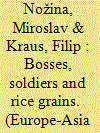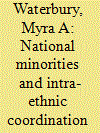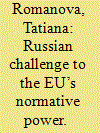|
|
|
Sort Order |
|
|
|
Items / Page
|
|
|
|
|
|
|
| Srl | Item |
| 1 |
ID:
145308


|
|
|
|
|
| Summary/Abstract |
Since 1975, the numbers of Vietnamese living in Europe have steadily increased. As new emigrants appeared in various countries, new types of crime came with them. Also in the Czech Republic, where a relatively large Vietnamese diaspora has been in existence since communist times, numerous Vietnamese criminal networks were established. The Vietnamese networks have a specific structure and modus operandi. Their bosses create parallel power structures within the Vietnamese diaspora and frequently merge together legal and illegal activities. The Vietnamese criminal networks are engaged in a broad spectrum of criminal activities, including economic crime, people smuggling and trafficking in drugs.
|
|
|
|
|
|
|
|
|
|
|
|
|
|
|
|
| 2 |
ID:
145304


|
|
|
|
|
| Summary/Abstract |
This article investigates the rationale behind compliance and non-compliance with EU conditionality in Georgia’s hybrid regime. Following the literature on competitive authoritarianism, it argues that the survival strategies of hybrid regime incumbents compel them to dodge conditionality in those policy areas that are crucial for maintaining the uneven political playing field. On the other hand, specific self-preservation tactics dictate that they should embrace neighbourhood Europeanisation in policy domains capable of generating votes. Taken together, these hypotheses alert us to the possibility that hybrid regime governments in the European Neighbourhood Policy (ENP) countries are cherry picking conditionality.
|
|
|
|
|
|
|
|
|
|
|
|
|
|
|
|
| 3 |
ID:
145305


|
|
|
|
|
| Summary/Abstract |
If Armenian and Azerbaijani negotiators ever agree on the future status of Nagorno-Karabakh, it will not necessarily resolve the long-running conflict, because any peace treaty would require the consent of the Karabakh Armenians, whose political representatives are currently excluded from peace negotiations. It is difficult to imagine the Karabakh Armenians consenting to such a treaty without a change in their perception of the Azerbaijanis. According to the theory of conflict transformation/peacebuilding, Nagorno-Karabakh’s civil society should be able to make a contribution to this change. Using the example of four Nagorno-Karabakh civil society organisations, this study shows how they positively or negatively influence conflict transformation.
|
|
|
|
|
|
|
|
|
|
|
|
|
|
|
|
| 4 |
ID:
145306


|
|
|
|
|
| Summary/Abstract |
This article analyses how Sarajevo’s young adults from a middle class, interethnic background deal with the rigid ethnic categorisation enforced by state institutions and society. Their strategies (exit, reframing, and partial separation) appear to be unsatisfactory to the actors themselves, and wield generally no influence on the institutions they wish to change. Three factors have been setting into motion this dynamic: first, the difficulty of escaping ethnic group thinking when attempting to reframe ethnic categories; second, the rationality of avoiding open defiance to ethnic categorisation; and third, the young adults’ tendency to centre their life on interethnic and international spaces. As a ‘project elite’, Sarajevo’s young adults are rather separated from society, both discursively and socio-economically.
|
|
|
|
|
|
|
|
|
|
|
|
|
|
|
|
| 5 |
ID:
145303


|
|
|
|
|
| Summary/Abstract |
This article investigates the role that intra-ethnic coordination and kin-state alliances play in shaping how parties that represent national minority groups approach their participation in the European Parliament (EP). This is done through an analysis of the political behaviour—electoral strategy, party group choice and modes of interest assertion in the EP—of ethnic minority parties in five Central and East European countries. The article finds that the role of intra-ethnic coordination and kin-state alliances is limited at the level of EP elections, but significant at the level of party group choice and in the visibility of minority issues in the EP.
|
|
|
|
|
|
|
|
|
|
|
|
|
|
|
|
| 6 |
ID:
145307


|
|
|
|
|
| Summary/Abstract |
An unofficial or ‘shadow’ economy like that in contemporary North Korea generates countervailing pressures for a socialist regime. It can buttress the regime by facilitating the cynical use of anti-market laws, alleviating shortages, helping the official economy to function, and creating vested interests in the status quo. On the other hand, the shadow economy can corrode the regime’s power by diminishing its control over society, encouraging scepticism about collective ideologies, and providing networks and material that can be used for opposition to the state. This article analyses these tensions in the DPRK, by drawing on 35 semi-structured interviews with North Korean defectors.
|
|
|
|
|
|
|
|
|
|
|
|
|
|
|
|
| 7 |
ID:
145302


|
|
|
|
|
| Summary/Abstract |
The article examines how Russian criticism of the normative power Europe (NPE) has evolved. Initially Russia insisted that NPE arguments covered realpolitik. However, two new approaches have recently emerged in Russian reporting on human rights in the EU. One is the demonstration that the EU does not qualify as a normative power. Another is the development of an alternative interpretation of human rights. Russia has, therefore, mastered all NPE critiques. This has occurred as the result of a change in how Russia views international relations. Moscow’s ultimate goal has, however, remained unchanged; it is to reaffirm its equality with key global players.
|
|
|
|
|
|
|
|
|
|
|
|
|
|
|
|
|
|
|
|
|